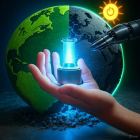How Fusion, Thorium, and AI Will Rewrite Civilization
From the moment early humans tamed fire, energy has defined the evolution of civilization. Every leap in societal complexity — from agriculture to the steam engine to the digital revolution — was driven by access to new forms of power. Now, humanity stands on the edge of a third energy revolution, powered not by carbon or combustion, but by fusion, thorium, and artificial intelligence.
This is not just a shift in technology — it is a tectonic realignment of how we live, govern, and relate to one another.
⚛️ Fusion: Turning Stars into Power Plants
Nuclear fusion — the process that powers the sun — holds the promise of limitless, clean, and safe energy. Unlike nuclear fission, which splits atoms and leaves radioactive waste, fusion combines light atomic nuclei (typically hydrogen isotopes like deuterium and tritium) to release energy without the long-lived waste or meltdown risks of current nuclear plants.
Key developments:
- ITER (France) is the world’s largest fusion experiment, aiming to reach net energy gain.
- Helion Energy (USA) claims it will deliver commercial fusion by 2028, using a radically smaller and cheaper model.
- China’s EAST reactor has already achieved temperatures five times hotter than the sun’s core.
If successful, fusion could extract fuel from seawater, generate baseload energy, and potentially decentralize energy access to a global scale. But fusion also demands enormous capital, decades of research, and extreme precision. The countries and corporations that master it first may hold energy dominance for centuries.
🪨 Thorium: The Forgotten Element Returns
While uranium has dominated nuclear energy, thorium is a safer, more abundant alternative that could reshape how nations approach energy independence.
Thorium advantages:
- Abundance: 3–4 times more plentiful than uranium, with large deposits in India, the U.S., and Brazil.
- Safety: Liquid fluoride thorium reactors (LFTRs) operate at atmospheric pressure, reducing meltdown risk.
- Waste: Produces fewer long-lived radioactive byproducts.
- Non-proliferation: Generates very little material usable for nuclear weapons.
India has invested heavily in thorium-based research to reduce its dependence on imported uranium. China has already launched experimental thorium reactors in desert regions. Yet the West lags behind, still anchored in uranium infrastructure and regulatory inertia.
With proper funding and global cooperation, thorium could lead to regionalized energy independence, especially in resource-rich yet energy-poor nations.
🤖 Artificial Intelligence: The New Brain of the Energy System
While fusion and thorium bring the raw power, AI brings the coordination, prediction, and efficiency needed to run next-gen energy systems.
Roles AI plays in the energy transition:
- Grid Optimization: Predicting energy demand, integrating renewables, and preventing blackouts in real-time.
- Fusion Control Systems: Managing the intense, chaotic behavior of plasma requires machine learning to make microsecond-level adjustments.
- Design Acceleration: AI models simulate and test new reactor designs far faster than traditional methods.
- Resource Management: Forecasting fuel consumption, waste output, and maintenance needs with precision.
AI may also become the gatekeeper of the global energy economy. Algorithms that control energy flows — much like those that now manage global finance — could become tools of power or oppression, depending on who owns and trains them.
🌐 Civilization After the Transition
What happens to civilization when energy becomes:
- Abundant (thanks to fusion),
- Accessible (via thorium), and
- Hyper-efficient (through AI)?
This isn’t just about cheaper electricity. It’s about the restructuring of civilization itself:
- Economic transformation: Industries once limited by energy costs (like desalination, space travel, carbon capture) become feasible at scale.
- Geopolitical shifts: Fossil-fuel-based power structures collapse. Nations with fusion tech or thorium reserves may emerge as new leaders.
- Cultural change: A civilization unshackled from energy scarcity may rethink labor, urban planning, and education. Automation and AI can reshape how we work — or whether we work at all.
But there are risks.
- Energy monopolies could form around proprietary AI-controlled fusion tech.
- Digital authoritarianism might arise if energy access becomes controlled by opaque algorithms.
- Global inequality may widen unless access to fusion and thorium is democratized.
🧠 A Civilization Designed by Intelligence, Powered by the Stars
This trio — Fusion, Thorium, and AI — represents something more than technological innovation. It is the material, energetic, and cognitive infrastructure of a future civilization.
- Fusion gives us the fire of stars.
- Thorium gives us localized, stable power.
- AI gives us the mind to orchestrate it all.
As they mature, these systems will force us to ask new questions:
Who owns energy? Who has the right to power? And what does a society look like when energy is no longer a limit?
✍️ Closing Thought
The future of civilization is being written today — not in ink, but in plasma arcs, liquid salts, and neural networks. Whether we build a world of abundance or a new kind of energy tyranny will depend on what values we embed into the technologies we now race to create.
We are not just building reactors. We are building the foundation of the next stage of human civilization.






